
April 11, 2013: Delegates at the G-8 Foreign Ministers meeting at Lancaster House in London, England. G-8 Foreign Ministers are holding a two day meeting where they will discuss the situation in the Middle East, including Syria and Iran, security and stability across North and West Africa, Democratic People's Republic of Korea and climate change. British Foreign Secretary William Hague will also highlight five key policy priorities. (AP)
LONDON – Foreign ministers from the G-8 nations on Thursday condemned North Korea's aggressive rhetoric and the development of its nuclear missile programs, saying that Pyongyang's recent actions threaten international security.
The statement came just hours after North Korea delivered a fresh round of rhetoric with claims it had "powerful striking means" on standby for a missile launch and amid speculation that it is preparing to test a medium-range missile during the country's upcoming national celebration.
In a communique following a meeting in London, the G-8 foreign ministers said Pyongyang's "current aggressive rhetoric" will only isolate North Korea. They urged North Korea to refrain from "further provocative acts" and engage in credible talks on abandoning all existing nuclear programs.
"G-8 foreign ministers condemned in the strongest possible terms the continued development of its nuclear weapons and ballistic missile programs by the Democratic People's Republic of Korea," the communique stated.
North Korea's decision to launch a long-range rocket in December and conduct an underground nuclear test in February "seriously undermine regional stability, jeopardize the prospects for lasting peace on the Korean Peninsula and threaten international peace and security," the communique said.
The statement added that ministers are concerned about Pyongyang's plans to re-open its Yongyon nuclear facility.
Germany's foreign minister Guido Westerwelle said North Korea's provocations are escalating a tense situation.
"This war rhetoric is not in any way acceptable and the G-8 has a united position on this," he said on the sidelines of the meeting.
The two-day talks among eight world powers focused on North Korea and the civil war in Syria. They also got some celebrity wattage from an appearance by Angelina Jolie, a U.N. special envoy for refugees who has teamed up with U.K. Foreign Secretary William to prevent sexual violence in war.
Hague -- flanked by Jolie and the U.N. special representative on sexual violence in conflict, Zanab Bangora -- announced that G-8 ministers pledged $36 million in additional funding to fight sexual violence in conflict.
Calling the issue "the slave trade of our generation," Hague said the ministers also agreed to declare that rape and serious sexual violence in conflict constitute war crimes and grave breaches of the Geneva Conventions.
Jolie welcomed the "long overdue stand" on sexual violence, adding that the international political will to combat sexual violence has been "sorely lacking."
Sexual violence has been used as a weapon in several conflicts, including the civil war in Syria, the Bosnian war, and during fighting in the Democratic Republic of Congo.
On Syria, where the U.N. estimates that a two-year civil war has killed more than 70,000 people, U.S. Secretary of State John Kerry met with Syrian opposition leaders in London on Wednesday to discuss ways to step up nonlethal aid to the rebels.
But there was no mention of assisting the rebels in Thursday's G-8 statement, reflecting divided opinion among the nations, and in particular Russia, on how to address the Syria conflict.
The communique said ministers are "appalled" at the deaths in Syria and the fact that the war has forced more than a million refugees to flee to neighboring countries.
The ministers "reaffirmed their commitment" to supporting a political transition in Syria and condemned the ongoing use of heavy weapons against residential areas.
"The humanitarian situation in Syria is deplorable and continues to worsen," the communique said, urging greater humanitarian assistance and improved access to the Syrian people.
Britain and France have been pushing for the European Union to lift or amend its arms embargo on Syria so weapons can be sent to rebel fighters.
Hague said earlier this week that no decisions have been made on whether the U.K. will allow the embargo to expire as scheduled June 1, effectively clearing the way to arm the rebels. He said if the situation in Syria continues to deteriorate, there will be a "strong case" for amending or lifting the arms embargo.
